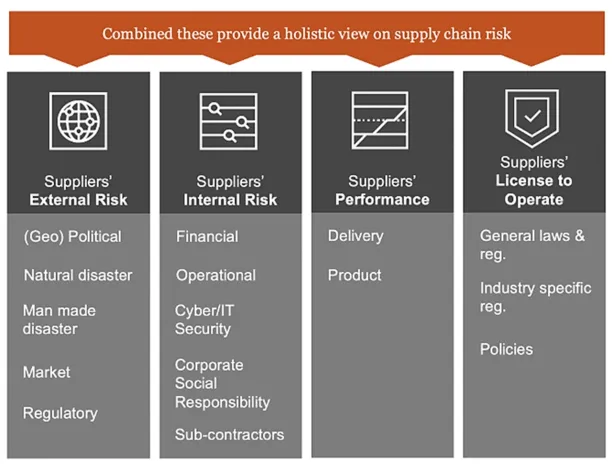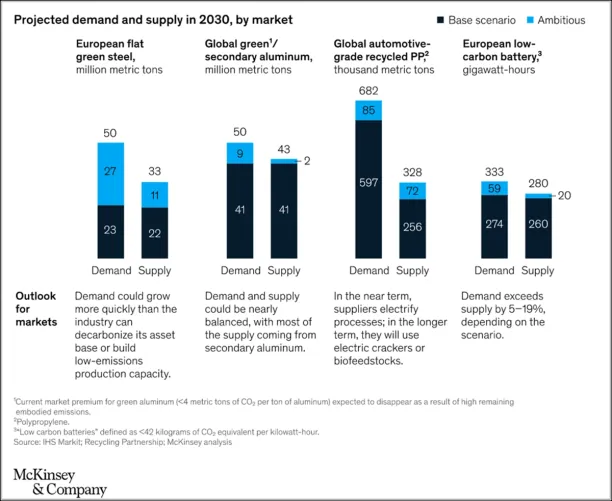5 Ways to Improve Supplier Relationship Management in 2024
In the post-pandemic world, the importance of supply chain resilience has become paramount. Supply chain leaders and governments are trying to sail through this storm by joining hands and collaborating.
An enhanced focus on expanding the supplier network and improving relations with existing suppliers can be a big step forward towards a more robust and resilient supply chain.
This article explores 5 ways to improve supplier relationship management to guide supply chain leaders toward a stronger and brighter future.
1. Build trust with your suppliers
Having mutual understanding is a fundamental element in a strong supplier relationship.
Know your suppliers
Understanding your suppliers’ goals, mission, and vision is an initial step of strengthening your relationship. Doing this will give you an understanding of what your supplier ultimately wants out of this relationship. Even before getting into any contractual agreements, it’s important to learn about the supplier from external sources, such as:
- Social media presence
- Philanthropic activities
- Business credibility and reputation
- Company history
- Priorities and future ambition
For example, a supplier’s business credibility can be learned by reading online reviews, customer testimonials, and online articles.
Make sure they know you
Communicating your expectations from this partnership is also important. Schedule regular meetings and explain the business’ mission, vision, and the ultimate goal of each future transaction. Have sufficient and updated content for the supplier to learn about your organization. This helps in strategic alignment and makes it easier to work with the suppliers.
2. Analyze and assess potential suppliers
Analyzing your operations and assessing potential suppliers is crucial to initiating a robust supplier relationship.
Analyze internal operations
Examining the company’s internal operations is a key element to a strong supplier relationship. Supply chain leaders should identify potential weaknesses within the company that can threaten or disrupt the transactions between the suppliers, and try to eliminate them collaboratively.
Having a dedicated supplier relationship manager can be beneficial. However, this depends on the size of the company, if a business can not hire a separate supplier relationship manager, they can give the responsibility to an existing one. Some large-scale organizations have whole departments or teams dedicated to improving supplier relationships.
Assess the supplier network
Assessing and having a view over your complete supplier network is also important for supply chain resilience. This involves assessing the potential and existing suppliers, and also the complete network to identify risks and uncertainties.
PwC offers a supplier risk assessment framework to assess the complete supplier network of a supply chain (see Figure 1). The risk considerations can enable a thorough evaluation of potential and existing suppliers.
Figure 1. PwC’s supplier risk assessment framework

After a thorough analysis and assessment of all the suppliers, supply chain managers can create or upgrade exhaustive agreements. They should also ensure that the agreement is responsibly followed by both parties.
3. Diversify and expand your supplier network
During the pandemic, global food supply chains collapsed due to major disruptions in demand and supply. One of the major reasons was the inability of suppliers to fulfill demand in the required time.
Diversify the network
An effective way of overcoming this issue is to diversify your supplier network through:
- Expanding the network by adding more suppliers
- Adding backup suppliers
- Less dependency on offshore suppliers
- Working more with new-shore suppliers
When the pandemic struck the food supply chains, some retail brands such as Carrefour contacted new suppliers from Pakistan when their current suppliers could not meet the demand surge.
Support the suppliers
Suppliers also have their own suppliers. While large-scale organizations have the resources and can invest in diversifying and expanding their supplier network, it is possible that their suppliers can not.
Therefore, it is important for supply chain leaders to also analyze the abilities of their suppliers and support them accordingly by slowing down the supply when necessary and if that does not work, switching to other suppliers.
4. Leverage digital technologies when it makes sense
Digital technologies such as artificial intelligence, IoT, cloud, data analytics, and automation are revolutionizing almost every sector.
Leverage SRM software
Using dedicated supplier relationship management (SRM) software can also help you integrate supplier data, enhance supplier engagement, automate SRM operations, and ensure compliance. Feel free to check our data-driven list of supplier relationship management software.
Leverage automation
Implementing an automated vendor self-service platform can also help improve SRM operations. It can provide an integrated platform for all suppliers to manage data, review orders, and record previous transactions.
PwC offers such a solution for supplier relationship optimization:
Balance digital dexterity
While implementing digital solutions in your business, make sure that your workforce is well-equipped and skilled to work with that technology.
To improve digital dexterity in your company, check out this quick read.
5. Invest in sustainable supply chain practices
Investing in sustainable supply chain practices can help improve the attractiveness of the company. As customers demand more sustainable products, companies are investing more in sustainable practices (See Figure 2).
Figure 2. Demand for green materials can increase in some large markets

Businesses want to work with sustainable suppliers and suppliers also want to work with businesses with a good ESG score. Therefore, improving sustainability can help expand your supplier network as more businesses would want to join your supply chain.
Work with sustainable suppliers
Sourcing from sustainable suppliers is also important in today’s world. Assessing your suppliers based on sustainability and sharing data can be an effective way to encourage sustainability across the supply chain.
Leveraging blockchain technology to increase the traceability of your supplier’s practices can also help improve supply chain sustainability.
To learn more about supply chain sustainability, check out our comprehensive articles
- 7 Ways to Improve Your Supply Chain Sustainability
- Top 5 Technologies Improving Supply Chain Sustainability
Further reading
- 4 Ways to Optimize Procurement
- Supply chain optimization
- Supply chain automation
- Improve supply chain sustainability
If you have any questions regarding supplier relationship management, feel free to contact us:



Comments
Your email address will not be published. All fields are required.